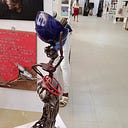Dear Àsàke

I often bored my friends with weekly episodes of the girl that had caught my eyes. The conversation usually went like this,
“So there’s this girl?”
“Tola?”
“No — ”
“Another girl?”
“This one is different. What I feel—”
“Not again. That’s what you said last week”
They often don’t want to listen. I don’t blame them—indeed it was a different girl every week. But one persisted that I couldn’t tell my friends. My mouth has never muttered it. It dares not. Still, she stood tall among all the miniscule infatuations I called love.
She was there from the very first day, but I was scared, utterly terrified that if I talk of her she would become like the other girls. The girl under the “Another girl bracket"—that she sinks into the weekly episodes of girls my friends have grown to acknowledge with disdain.
So I savour us in the quiet of my mind where my mouth does not move, and my eyes are closed. I imagine us in the sphere of a reality where we are us. I will think up orikis and write them down so I can say them to you during our evening stroll as we pass Maintenance and walk into the darkness beyond it.
Oh, how I love to bring you out at night! The thrill of comparing you to the brilliance of the moon and the serenity of the night. Your beauty reminds me of the supernatural world. Why wouldn’t it? There is no way two atoms coincidentally combined to make you. God was definitely involved.
Adúmádán
Apón b’épo ré
Orékeléwa
Àyànfé
Ìbàdí àrán
El’ésè osùn
Aló m’óko
Awéléwà
I would say them in my grossly awful Yoruba accent, and you would laugh so hard I would have to join you that the boys coming out of the Oduduwa gate would think we are raving mad. You would ask what they meant, and I will get so anxious that I won’t be able to look into your eyes. When I am anxious, you see the worst of me. I know that, Awelewa. I know you don’t like it. But I can’t help it.
In our father’s language, they say Arewà Obìnrin to dara bi Egbin: meaning a beautiful woman who is as good-looking as an Antelope. I imagine your face contorting when I say this. Antelope? You might ask. But indeed, antelope are, in our culture, the most beautiful of all animals. And among men, you are our antelope. So when I see the most beautiful, am I not permitted to step off a little? No one sees the sun and does not squint.

Our fathers, in their great wisdom, called ladies like you Arewà. Arewa, which means the most beautiful. Look at me; if you ever catch me staring—let me have it — the world is dull enough, and maybe Elon Musk is right.
There are aliens among us. What is it like in heaven, Arewà? What is God like?
Sometimes I wonder what it will be like to hold your hands and have the gods call us kòkòrò ìfé Love birds. I wonder when I will be able to use the word Onìtémi
Àsàké, for you and only you do I give my favourite Yoruba name. They say a man is only worthy of the love he deserves. Alas, the gods have separated us. They try to tear us apart like they did our ancestors, but even the gods can’t sever what we have.
Love will always find a way, Àsàké. We would go on our evening strolls again with our hands locked. Unlike before, when the staring eyes of the dreaded maintenance gate often dissuaded me, I will remember to kiss you goodnight. I will call you Àsàké and make the gods watch as I take their favourite. Kiss you again and again in front of gods and men alike. Then I will call you Onìtémi and watch the world grow jealous.
